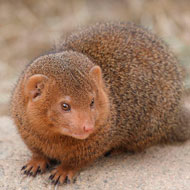
Bristol researchers find mongooses act similarly to human soldiers on sentry duty
Dwarf mongooses adapt their behaviour according to the level of danger in the same way as soldiers on sentry duty, new research has found.
A new study published in Animal Behaviour shows mongooses on "sentry duty" altered their behaviour depending on social signals, including alarm calls, and environmental conditions, such as wind speed.
Such factors influenced decisions about when they should go on duty, the positions they adopted and how long they remained at their post.
Julie Kern, lead author and PhD student at the University of Bristol, said: "Our work demonstrates how sentinel behaviour is adjusted flexibly with regard to information presented on various time scales, highlighting the complexity of animal decision-making processes".
The research team observed the behaviour of a population of individually marked, wild dwarf mongooses that were accustomed to the presence of observers close by.
Dwarf mongooses live in close family groups of five to 20 individuals. Nights are spent in a safe retreat and the animals emerge during the day to forage for insects and lizards. A wide range of predators pose a threat, including snakes, cats and birds of prey.
Foraging mongooses rely on sentinels to alert them to approaching danger, allowing them to adjust their own behaviour.
Image © Miika Silfverberg (MiikaS) from Vantaa, Finland/Wikimedia Commons/Creative Commons Attribution-Share Alike 2.0 Generic



 The veterinary mental health charity Vetlife is inviting the veterinary community to join it for a sponsored cold-water dip.
The veterinary mental health charity Vetlife is inviting the veterinary community to join it for a sponsored cold-water dip.